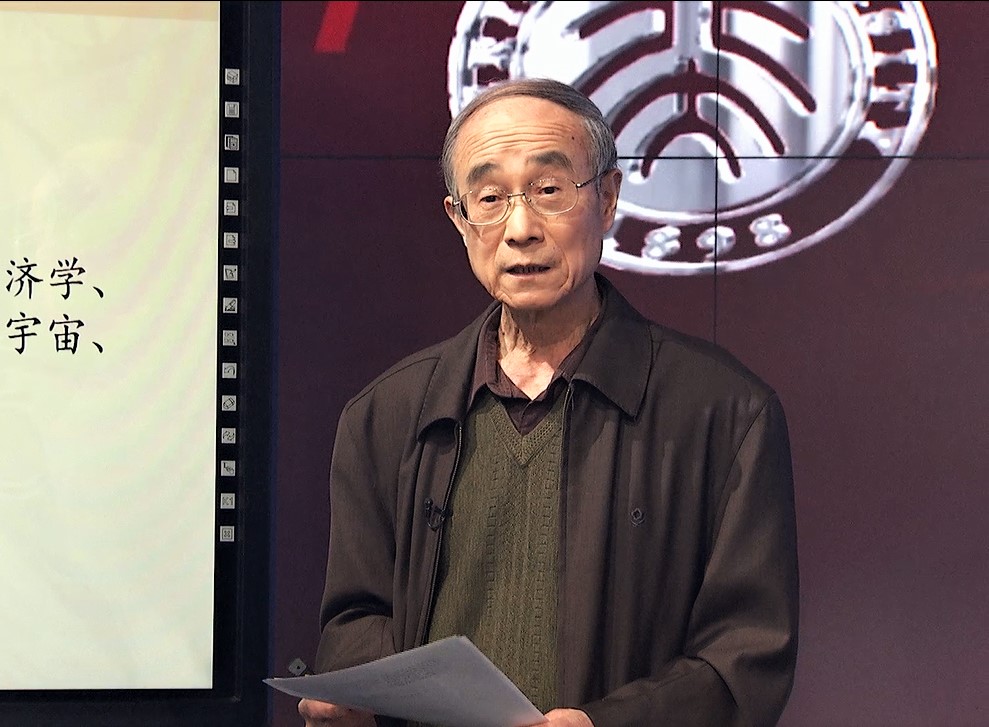[The Charm of Interdisciplinary Studies] Qian Chengdan's views on liberal arts
Jun 08, 2020
Peking University, June 8, 2020: On May 31, the Academy for Advanced Interdisciplinary Studies (AAIS) of Peking University held the fourth lecture of “The Charm of Interdisciplinary Studies” series. The lecture, focusing on interdisciplinary studies in liberal arts, was delivered by Qian Chengdan, Boya chair professor of Peking University, director of the Institute of Area Studies (IAS) at PKU, and academic member of Chinese Academy of History. The lecture was hosted by Ning Qi, dean of the School of Foreign Languages and executive vice director of IAS. The lecture was broadcast on multiple online platforms and was viewed by more than 1.5 million people.
Qian Chengdan acknowledged the importance of interdisciplinary studies in humanities and social sciences. He traced the origin of knowledge back to the ancient Greek philosophers, including Socrates, Plato, and Aristotle, and emphasized their extensive knowledge. Confucius, Laozi, and Mozi, who represent the origin of ancient Chinese culture, also had a wide range of multidisciplinary knowledge. With these examples, Qian pointed out that all different kinds of knowledge were interrelated as a whole at the beginning, so there was no division of disciplines.
Qian then went through western and eastern traditional education systems to analyze the historical origins of interdisciplinary studies. He introduced respectively the education of ancient Greek Academy of Athens, Plato’s thoughts on civic education, the early form of western universities in the Middle Ages, the late British public schools, the “six arts” taught by official scholars in ancient China’s Zhou Dynasty (1046 BC-256 BC), the standards of Confucian teachings and folk education. By elaborating these famous forms of education, Qian said that during the early development of civilization, whether it was the traditional education in the West or that in ancient China, knowledge was regarded as a whole.
Qian specified the significance of interdisciplinary studies for personal achievement with the examples of famous figures in oriental and western history. He talked about eminent European scholars from the Middle Ages to the Enlightenment, including Augustine, Thomas Aquinas, Leonardo da Vinci, and Kant, et al. Qian also pointed out that there existed no classifications of disciplines in western societies until the Enlightenment. Qian went on to introduce famous Chinese historical figures like Sima Qian, Zhuge Liang, Zhu Xi and Xu Guangqi, and concluded that accomplished people all had a good command of comprehensive knowledge.
Qian said that it was in modern era that the inherent integrity of knowledge was broken and the division of disciplines had emerged, which was an important change in human knowledge system. He thought that it had two major direct causes: one was the development of science in the modern West, which required the division of knowledge to cultivate professionals and to facilitate the in-depth development of science; the other was that modern universities originated by William Humboldt started to combine research and teaching and to operate by separate schools and departments. Qian thought that on the one hand the division of disciplines brought about the further development of knowledge and the continuous progress in research, but on the other hand, it led to the isolation of different kinds of knowledge and dogmatism in studying.
Regarding the necessity of interdisciplinary studies, Qian said that interdisciplinary studies are necessary for some disciplines to conduct in-depth research, and that the interaction between different disciplines could create new ideas and new research fields. He stressed that interdisciplinary studies have become a research trend. He believed that disciplines interact on three levels respectively, first on knowledge, second on thinking patterns, and third on research methodology.
At the end of the lecture, Qian summarized the developing process of human knowledge with four words, “broadness”, “grandness”, “preciseness”, and “profoundness”. He believed that in pursuit of knowledge, the goal of human beings has changed from broadness to profoundness, then from profoundness to grandness, and later from grandness to preciseness. Humans divided and classified knowledge into multiple disciplines for the depth of learning, and should also carry out interdisciplinary studies for the breadth of their research. Only by combining the two will a constant academic development be promoted. In the Q&A session, Qian answered some questions about the basic situation of area studies and how researchers could break the barriers among disciplines.
Written by: Fan Xueyuan
Edited by: Zhou Meng
Source: PKU News (Chinese)
